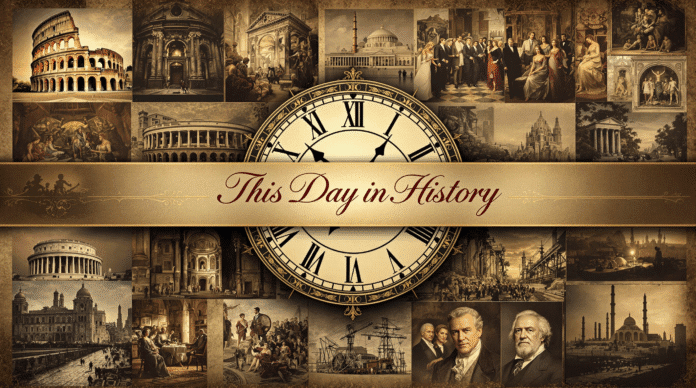This Day in History: August 4
From the birth of a U.S. president to groundbreaking advances in human rights and aviation, August 4th marks a day filled with turning points that shaped the world. Here’s a deep dive into five notable events from this day in history:
1. 1961 – Barack Obama, 44th President of the United States, is Born
Barack Hussein Obama II was born in Honolulu, Hawaii, on August 4, 1961. He would rise to become the first African American President of the United States, elected in 2008 and re-elected in 2012. A graduate of Columbia University and Harvard Law School, Obama began his political career as a community organizer in Chicago before becoming a U.S. Senator from Illinois.
Historical Significance:
Obama’s election marked a historic breakthrough in American racial and political history. His presidency brought sweeping changes in healthcare (Affordable Care Act), foreign relations (Iran Nuclear Deal, Cuba thaw), and environmental policy. His charisma, oratory skills, and message of hope and change inspired a generation.
Lesser-Known Fact:
Obama won the Nobel Peace Prize in 2009 just months into his presidency for his “extraordinary efforts to strengthen international diplomacy.”
2. 1914 – Germany Invades Belgium, Britain Enters World War I
On August 4, 1914, Germany invaded neutral Belgium to outflank French forces. This violation of Belgian neutrality prompted Britain to declare war on Germany, formally drawing the British Empire into World War I.
Historical Significance:
This moment transformed what had been a continental European conflict into a global war. The violation of Belgian neutrality galvanized British public opinion and marked the beginning of one of the deadliest wars in history.
Lesser-Known Fact:
The German invasion of Belgium was part of the Schlieffen Plan, a military strategy designed to quickly defeat France before turning eastward to fight Russia.
3. 1944 – Anne Frank and Her Family Arrested by the Gestapo
On this day in 1944, the Nazi secret police (Gestapo) raided the secret annex in Amsterdam where Anne Frank, her family, and four others had been hiding for over two years. The arrest was prompted by an anonymous tip.
Historical Significance:
Anne Frank’s diary became one of the most profound and widely read personal accounts of the Holocaust. Her story put a human face on the unimaginable suffering of millions and continues to educate future generations on the horrors of intolerance and genocide.
Lesser-Known Fact:
The identity of the person who betrayed the Franks remains unknown, despite extensive investigations and theories.
4. 1892 – Lizzie Borden’s Father and Stepmother are Murdered in Massachusetts
Andrew and Abby Borden were found brutally murdered in their Fall River, Massachusetts home. Their daughter, Lizzie Borden, was arrested and charged with the crimes.
Historical Significance:
The Borden case became one of the most sensational and widely covered trials in American history. Lizzie was acquitted, but suspicion lingered. The case helped set early precedents for media influence on criminal justice.
Lesser-Known Fact:
Despite being acquitted, Lizzie lived the rest of her life in Fall River, ostracized by the community—and even changed her name to “Lizbeth.”
5. 1901 – Louis Armstrong, Jazz Legend, is Born in New Orleans
Though some records list July 4 as his birth date, Louis Armstrong himself claimed he was born on August 4, 1901. Known affectionately as “Satchmo” or “Pops,” Armstrong revolutionized American music with his trumpet playing and gravelly voice.
Historical Significance:
Armstrong helped transform jazz into a soloist’s art form, influencing countless musicians across genres. He broke racial barriers during a deeply segregated time, becoming one of the first Black entertainers to achieve mainstream popularity worldwide.
Lesser-Known Fact:
Armstrong’s love of laxatives was legendary—he even signed autographs with “Swiss Kriss” (a herbal laxative) as part of his name.



